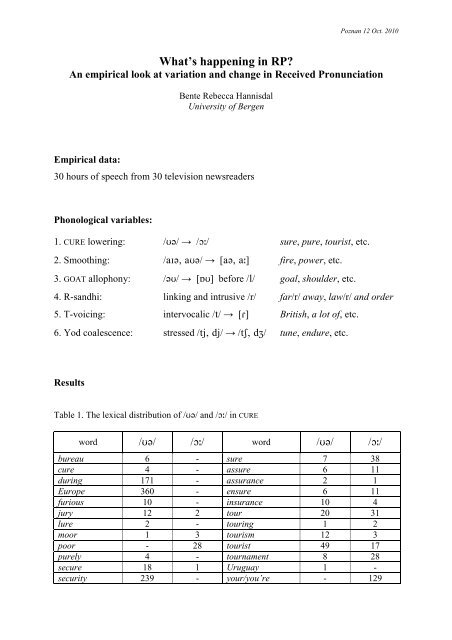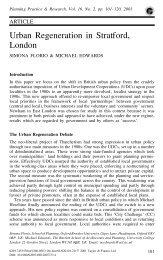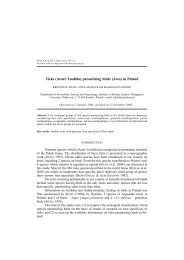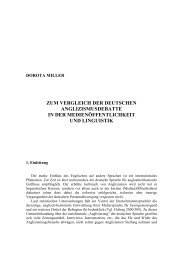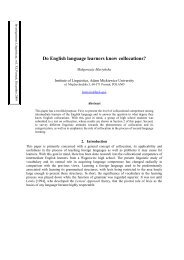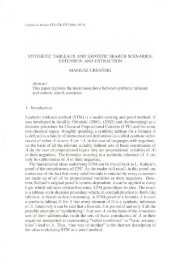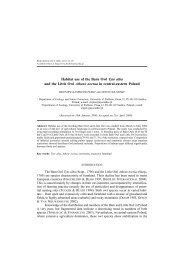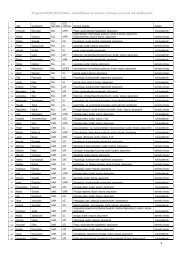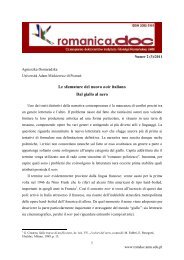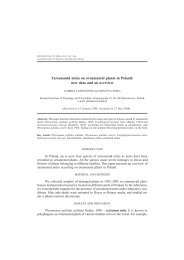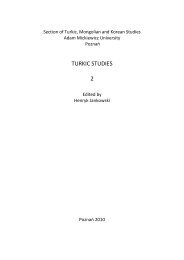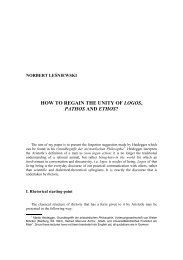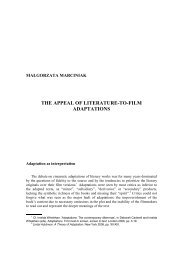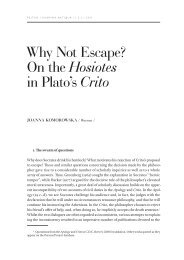What's happening in RP? - AMU Faculty of English
What's happening in RP? - AMU Faculty of English
What's happening in RP? - AMU Faculty of English
You also want an ePaper? Increase the reach of your titles
YUMPU automatically turns print PDFs into web optimized ePapers that Google loves.
Poznan 12 Oct. 2010<br />
What’s <strong>happen<strong>in</strong>g</strong> <strong>in</strong> <strong>RP</strong><br />
An empirical look at variation and change <strong>in</strong> Received Pronunciation<br />
Bente Rebecca Hannisdal<br />
University <strong>of</strong> Bergen<br />
Empirical data:<br />
30 hours <strong>of</strong> speech from 30 television newsreaders<br />
Phonological variables:<br />
1. CURE lower<strong>in</strong>g: /T/ → /N9/ sure, pure, tourist, etc.<br />
2. Smooth<strong>in</strong>g: /`H+`T/ → [`+`9] fire, power, etc.<br />
3. GOAT allophony: /T/ → [PT] before /k/ goal, shoulder, etc.<br />
4. R-sandhi: l<strong>in</strong>k<strong>in</strong>g and <strong>in</strong>trusive /r/ far/r/ away, law/r/ and order<br />
5. T-voic<strong>in</strong>g: <strong>in</strong>tervocalic /s/ → [3] British, a lot <strong>of</strong>, etc.<br />
6. Yod coalescence: stressed /si+ci/ → /sR+cY/ tune, endure, etc.<br />
Results<br />
Table 1. The lexical distribution <strong>of</strong> /T/ and /N9/ <strong>in</strong> CURE<br />
word /T/ /N9/ word /T/ /N9/<br />
bureau 6 - sure 7 38<br />
cure 4 - assure 6 11<br />
dur<strong>in</strong>g 171 - assurance 2 1<br />
Europe 360 - ensure 6 11<br />
furious 10 - <strong>in</strong>surance 10 4<br />
jury 12 2 tour 20 31<br />
lure 2 - tour<strong>in</strong>g 1 2<br />
moor 1 3 tourism 12 3<br />
poor - 28 tourist 49 17<br />
purely 4 - tournament 8 28<br />
secure 18 1 Uruguay 1 -<br />
security 239 - your/you’re - 129
Distribution largely determ<strong>in</strong>ed by phonetic environment:<br />
• /T/ after C/j/ and before prevocalic /r/<br />
• /N9/ <strong>in</strong> other contexts<br />
Table 2. Smooth<strong>in</strong>g: total scores<br />
N %<br />
[`+`9] 621 46.4<br />
[`H+`T] 718 53.6<br />
Table 3. The use <strong>of</strong> GOAT allophony<br />
Categorical<br />
allophony<br />
Variable<br />
allophony<br />
No allophony<br />
Number <strong>of</strong> speakers 24 4 2<br />
Table 4. R-sandhi: total scores<br />
L<strong>in</strong>k<strong>in</strong>g /r/<br />
Intrusive /r/<br />
N % N %<br />
/r/ 3612 59.8 182 32.6<br />
Ø 2433 40.2 376 67.4<br />
Variation ma<strong>in</strong>ly constra<strong>in</strong>ed by l<strong>in</strong>guistic factors.<br />
Sandhi /r/ significantly disfavoured<br />
• <strong>in</strong> pre-stress environments for !hours, Malaga !airport<br />
• before proper nouns Mister Annan, Jemaah Islamiyah<br />
• <strong>in</strong> the vic<strong>in</strong>ity <strong>of</strong> another /r/ terror attacks, area around
Clause boundary/tone group boundary did not prevent the <strong>in</strong>sertion <strong>of</strong> /r/:<br />
[1] What about there <strong>in</strong> S<strong>in</strong>gapore[r] Is there that feel<strong>in</strong>g…<br />
[2] Let’s get the latest news from Manila[r]. Our correspondent John McClane is there.<br />
[3] …if the rebels do withdraw[r], as Barnaby Phillips now reports.<br />
[4] We shouldn’t assume that this is someone from America[r], it could be somebody<br />
liv<strong>in</strong>g <strong>in</strong> the Philipp<strong>in</strong>es.<br />
[5] We’re just gett<strong>in</strong>g some news <strong>in</strong> from the Gulf headquarters <strong>in</strong> Doha[r]. A spokesman<br />
has said that…<br />
Table 5.1. T-voic<strong>in</strong>g: total scores<br />
N %<br />
[3] 1976 35.2<br />
[s] 3639 64.8<br />
Table 5.2. T-voic<strong>in</strong>g accord<strong>in</strong>g to word position<br />
Word-f<strong>in</strong>al<br />
Word-medial<br />
N % N %<br />
[3] 1344 66.9 632 17.5<br />
[t] 664 33.1 2975 82.5<br />
Table 6. Yod coalescence: total scores<br />
N %<br />
/sR+cY/ 286 46.4<br />
/si+ci/ 331 53.6
T-voic<strong>in</strong>g: mean scores for gender<br />
Males: 42,5<br />
Females: 26,6<br />
Smooth<strong>in</strong>g: mean scores for gender<br />
Males: 59,0<br />
Females: 33,6<br />
Males more prone to phonological reduction<br />
T-voic<strong>in</strong>g, yod coalescence and GOAT allophony represent new developments <strong>in</strong> <strong>RP</strong>.<br />
Inclusion <strong>of</strong> a feature <strong>in</strong> <strong>RP</strong> depends on how the accent is def<strong>in</strong>ed.<br />
Def<strong>in</strong><strong>in</strong>g <strong>RP</strong>:<br />
- An abstract norm<br />
- The BBC accent<br />
- Prestige<br />
- Social criteria<br />
- Non-localisability<br />
A feature can be <strong>in</strong>cluded <strong>in</strong> <strong>RP</strong> if it is geographically widespread.<br />
<strong>RP</strong> does not <strong>in</strong>corporate all non-regional features, but excludes all regional features.<br />
T-voic<strong>in</strong>g, yod coalescence and GOAT allophony can be documented as supra-local.<br />
Non-localisability can serve as a criterion for delimit<strong>in</strong>g the <strong>RP</strong> accent.<br />
It allows for changes<br />
It is <strong>in</strong> l<strong>in</strong>e with the <strong>RP</strong> tradition<br />
It can be tested objectively
References<br />
Brown, G. 1990. Listen<strong>in</strong>g to spoken <strong>English</strong>. 2 nd ed. London: Longman.<br />
Burchfield, R. 1981. The spoken word. A BBC guide. London: British Broadcast<strong>in</strong>g<br />
Corporation.<br />
Byrd, D. 1994. Relations <strong>of</strong> sex and dialect to reduction. Speech Communication 15, 39-54.<br />
Chambers, J. K. 2002. Sociol<strong>in</strong>guistic theory. 2 nd ed. Oxford: Blackwell.<br />
Cruttenden, A. 2001. Gimson’s Pronunciation <strong>of</strong> <strong>English</strong>. 6 th ed. London: Arnold.<br />
Fabricius, A. 2000. T-glottall<strong>in</strong>g between stigma and prestige: a sociol<strong>in</strong>guistic study <strong>of</strong><br />
modern <strong>RP</strong>. Unpublished PhD thesis, Copenhagen Bus<strong>in</strong>ess School.<br />
Foulkes, P. and Docherty, G. (eds.) 1999. Urban voices. Accent studies <strong>in</strong> the British Isles.<br />
London: Arnold.<br />
Gimson, A.C. 1964. Phonetic change and the <strong>RP</strong> vowel system. In D. Abercrombie et al.<br />
(eds.), In honour <strong>of</strong> Daniel Jones: papers contributed on the occasion <strong>of</strong> his eightieth<br />
birthday, 12 September 1961. London: Longman. 131-136.<br />
Jones, D. 1917. An <strong>English</strong> pronounc<strong>in</strong>g dictionary. London: J. M. Dent & Sons.<br />
Kerswill, P. 2001. Mobility, meritocracy and dialect levell<strong>in</strong>g: the fad<strong>in</strong>g (and phas<strong>in</strong>g) out <strong>of</strong><br />
Received Pronunciation. In P. Rajamäe and K. Vogelberg (eds.), British studies <strong>in</strong> the<br />
new millennium: challenge <strong>of</strong> the grassroots. Tartu: University <strong>of</strong> Tartu. 45-58.<br />
Lloyd James, A. 1931. Broadcast <strong>English</strong> I. 2 nd ed. London: British Broadcast<strong>in</strong>g Corporation.<br />
Milroy, J. 2001. Received Pronunciation: who “receives” it and how long will it be “received”<br />
Studia Anglica Posnaniensia 36, 15-33.<br />
Milroy, L. 1987. Observ<strong>in</strong>g and analys<strong>in</strong>g natural language. Oxford: Blackwell.<br />
Nolan, F. 1999. The shift<strong>in</strong>g sands <strong>of</strong> <strong>English</strong> pronunciation. In P. Rajamäe (ed.), New Brita<strong>in</strong>:<br />
The heritage <strong>of</strong> the past and the challenge <strong>of</strong> the future. Proceed<strong>in</strong>gs <strong>of</strong> the 2nd<br />
International Tartu Conference on British Studies, University <strong>of</strong> Tartu, August 24-25<br />
1998. 76-93.<br />
Roach, P., Hartman, J. and Setter, J. (eds.) 2003. <strong>English</strong> pronounc<strong>in</strong>g dictionary. 16 th ed.<br />
Cambridge: Cambridge University Press.<br />
Smith, J. 1996. An historical study <strong>of</strong> <strong>English</strong>: function, form and change. London: Routledge.<br />
Taylor, J. 1998. What, pray, is <strong>happen<strong>in</strong>g</strong> to dear old <strong>RP</strong> La L<strong>in</strong>guistique 34: 2, 141-151.<br />
Tollfree, L. 1999. South East London <strong>English</strong>: discrete versus cont<strong>in</strong>uous modell<strong>in</strong>g <strong>of</strong><br />
consonantal reduction. In Foulkes and Docherty 1999a, 163-184.<br />
Trudgill, P. 1986. Dialects <strong>in</strong> contact. Oxford: Basil Blackwell.
Trudgill, P. 2002. Sociol<strong>in</strong>guistic variation and change. Ed<strong>in</strong>burgh: Ed<strong>in</strong>burgh University<br />
Press.<br />
Upton, C. 2004. Received Pronunciation. In E. Schneider et al. (eds.), A handbook <strong>of</strong> varieties<br />
<strong>of</strong> <strong>English</strong>. Volume 1: Phonology. Berl<strong>in</strong>: Mouton de Gruyter. 217-230.<br />
Wells, J.C. 1982. Accents <strong>of</strong> <strong>English</strong> (3 vols.). Cambridge: Cambridge University Press.<br />
Wells, J.C. 1994a. The Cockneyfication <strong>of</strong> R.P. In G. Melchers and N.-L. Johannesson (eds.),<br />
Non-standard varieties <strong>of</strong> language. Stockholm Studies <strong>in</strong> <strong>English</strong> 84. Stockholm:<br />
Almqvist & Wiksell. 198-205.<br />
Wells, J.C. 1994b. Transcrib<strong>in</strong>g Estuary <strong>English</strong>: a discussion document. Speech Hear<strong>in</strong>g and<br />
Language: UCL Work <strong>in</strong> Progress 8, 259-267.<br />
Wells, J.C. 1999. British <strong>English</strong> pronunciation preferences: a chang<strong>in</strong>g scene. Journal <strong>of</strong> the<br />
International Phonetic Association 29: 1, 33-50.<br />
Wells, J.C. 2000. Longman Pronunciation Dictionary. New edition. London: Longman.


